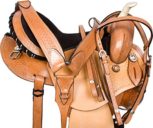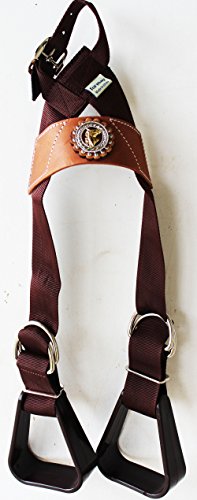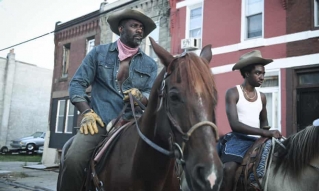One of the great things about the world in which we live is that there’s room for all manner of interests and identities. No matter how niche and/or unlikely the pursuit, there will be others who share feelings about it.
These subcultures sometime surface in mainstream awareness, but others simply go on, whirring along beneath the zeitgeist for decades. And again, no matter how incongruous and unlikely they may sound, they are very real and very important to those whose passions they reflect.
“Concrete Cowboy,” the new Netflix film directed by Ricky Staub, is the story of one such subculture. Adapted by Staub and Dan Walser from Greg Neri’s 2011 novel “Ghetto Cowboy,” it’s the story of a multigenerational group of horse enthusiasts operating out of inner-city Philadelphia. Through their connection to horses, these people find what they need.
(It’s worth noting that several supporting roles are played by real-life members of Fletcher Street Stables, the group upon whom Neri’s novel was largely based.)
It’s also the story of a young man who is thrust into the midst of this world, left to contextualize it alongside his own sphere of understanding, introduced into it all by the father who is all but a stranger to him. But even with influences tugging from all sides, he is the one who ultimately must make the decision about the man he wants to become.
Cole (Caleb McLaughlin, TV’s “Stranger Things”) is a troubled teenager living in Detroit, struggling in school and with the law. At her wit’s end, his mother Nessie (Lorraine Toussaint, TV’s “The Equalizer”) makes a desperate move, taking Cole to Philadelphia to spend to the summer with his father Harp (Idris Elba, TV’s “In the Long Run”).
Cole wants nothing to do with his father or Philadelphia, but he’s left with little choice, even though there are surprises seemingly around every corner – like when he goes into his dad’s place for the first time and discovers a horse living there.
Yep – a horse.
As it turns out, Harp is one of a group of horse lovers headquartered just down the block on Fletcher Street. This assemblage of equine enthusiasts has been around ever since there have been horses in the city. At one time, the scene was widespread and robust, but now, just a few outposts remain, the rest fallen victim to that grim harbinger of progress – impending gentrification.
Cole is intrigued by this world – particularly when he makes a connection with a heretofore unapproachable horse named Boo – but he is also being pulled toward the streets, thanks largely to his reconnection with childhood friend Smush (Jharrel Jerome, TV’s “Mr. Mercedes”), who has become a hustler looking to score big through making his way up the ladder in the drug trade.
Initially, Cole is able to compartmentalize somewhat. His time at the stables leads to burgeoning friendships and a growing sense of community, not to mention slowly, haltingly connecting with his father. His time with Smush is exciting by way of being both new and familiar at once. These two conflicting impulses can’t coexist forever – particularly when Cole has to keep his ongoing relationship with Smush a secret from his father, who expressly forbade it.
Two new worlds for this young man – and no guarantee that either one will last.
The fact that this is based on a real place and real people, with some actual Fletcher Street regulars populating the periphery of the film, is fascinating. These people are in essence inner-city cowboys – who’d have thought such a thing existed? “Truth is stranger than fiction” is a cliché for a reason; sometimes, the world gifts us with a story that is simply too good to be made up. And while that casting doesn’t always work, it’s undeniable that the energy these real people provided was a key part of the film’s considerable success.
Stories about fathers and sons pose an interesting challenge. While the emotion of that dynamic provides a built-in springboard of sorts, we’ve also seen that dynamic play out on pages, stages and screens since time immemorial. We’ve told stories about fathers and sons since we’ve been telling stories, so finding a new way to explore that relationship is tricky; one of the reasons that “Concrete Cowboy” is so effective is because it so deftly uses its unique framework in service to bringing forward that up-and-down journey to connection.
The old/new dichotomy is a driving force here as well, the conflict between the constant search for what’s next versus the inherent comfortability of what’s been. Setting these urban riders, the spiritual descendants of the real cowboys of the Old West, against the forces of economic progress pushing development that in turn lays waste to tradition, is what lends the film its heft of conscience.
Idris Elba gives a typically excellent performance as Harp. He’s gruff and brusque, but manages to give us glimpses of the pain underneath even as we’re never quite invited to let him off the hook for past actions. It’s nice to see McLaughlin in this kind of grown-up role – he deserves the kind of breakout that many of his “Stranger Things” costars have experienced. If he can keep doing work like this, I think he gets there sooner rather than later. And Jerome is a rising star in his own right, giving a surprisingly nuanced performance here. Oh, and Method Man is here, as a cop of all things; he’s sneakily become a low-key good actor in recent years, with his skills on display here.
The real-life Fletcher Street folks who fill in the margins of the movie are fine. There are some moments where their inexperience is glaringly obvious, but for the most part, it’s OK – the verisimilitude is ultimately worth it.
“Concrete Cowboy” is an interesting movie – part father-son drama, part urban western, part coming-of-age tale, all with a healthy helping of damn the man. It’s also heartfelt and well-crafted, with quality performances and plenty to say. So saddle up, friends – this one is worth the ride.
[4 out of 5]








Comments
Comments are disabled for this post.